The Benefits of Including Loved Ones in the Recovery Process

Introduction
The journey of recovery from addiction is multifaceted, involving not only the individual grappling with the disorder but also their entire family. Research underscores the significant positive influence that family involvement can have on the recovery process, offering both emotional and practical support that is instrumental in overcoming substance use disorders. This article delves into the various benefits of involving family members in treatment, illustrating how their support can enhance recovery outcomes, improve emotional well-being, and foster long-term sobriety.
Positive Impacts of Family Involvement in Recovery
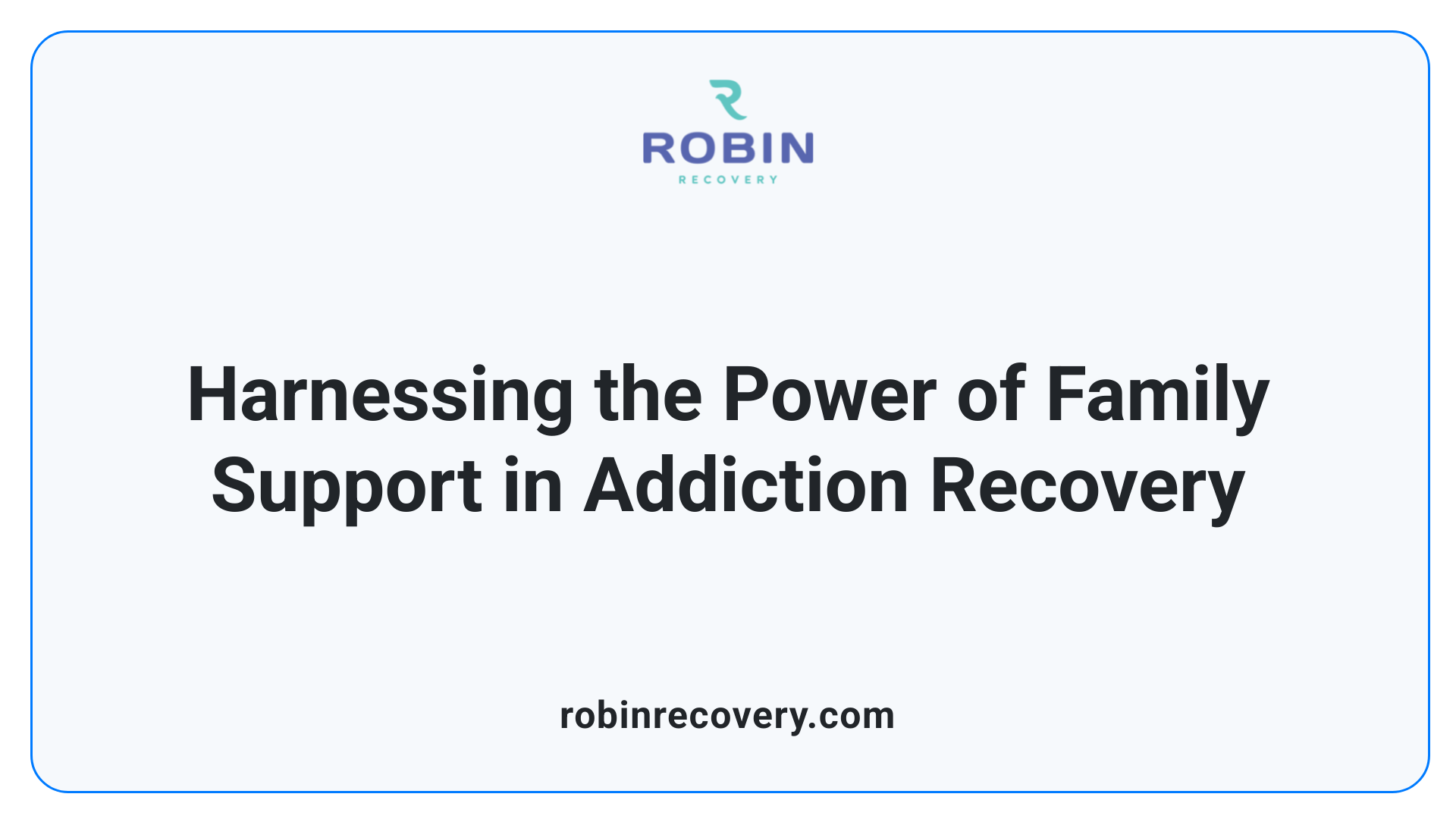
What positive impacts can family involvement have on addiction recovery?
Family involvement in addiction recovery can have numerous positive impacts on the individual struggling with substance use disorders. Studies indicate that when families participate in treatment, there is a reduction in hospitalizations and relapses, as well as better adherence to treatment plans, leading to higher recovery rates.
Family support can help address underlying issues that contribute to substance use, fostering a healthier home environment. For example, families that engage in therapy sessions often learn to communicate effectively, set healthy boundaries, and develop supportive routines.
The presence of a stable and supportive family can also mitigate the negative effects that a parent's substance use can have on children. For instance, offspring of parents with substance use issues may experience improved emotional well-being and better academic outcomes when family dynamics are positively influenced.
Overall, active family involvement not only aids the recovering individual but also promotes the well-being of the entire family unit, enhancing the support network crucial for long-term sobriety.
Impact AreaPositive EffectNotes Reduction in hospitalizations Fewer emergency interventions needed Stability in the home environment helps reduce crises Better adherence to treatment plans Increased commitment to recovery strategies Family encouragement boosts motivation Mitigation of negative effects on children Improved emotional and academic performance Healthy interactions support children's development
Emotional and Psychological Benefits of Family Support
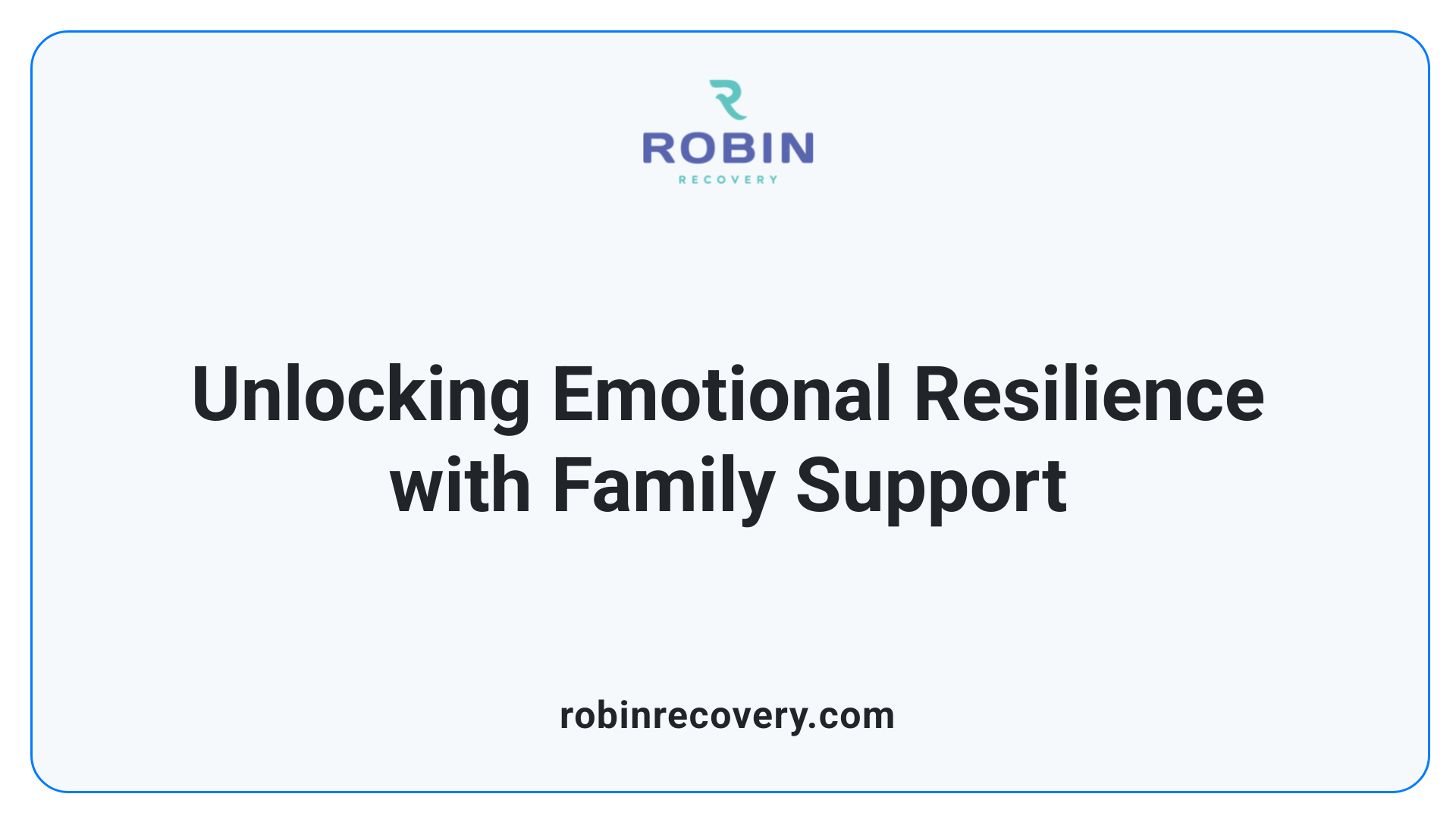
How can family support provide emotional and psychological benefits during recovery?
Family support is instrumental in the recovery journey, particularly in ensuring emotional stability. Families provide a sense of affection and belonging, which is vital for individuals facing the challenges of addiction. This emotional backing creates a secure environment that fosters both hope and resilience, helping individuals to overcome the hurdles associated with recovery.
Research indicates a strong correlation between family involvement and the emotional well-being of those in recovery. Many individuals view their families as primary supporters, highlighting the significant role family encouragement plays in maintaining motivation and adherence to recovery plans.
Additionally, the active participation of family members in the recovery process extends beyond emotional support. Families can offer practical assistance, ensuring that the individual feels connected and involved, which enhances the overall recovery experience. This involvement not only fosters a feeling of togetherness but also builds trust and communication within the family dynamic, leading to a healthier atmosphere conducive to recovery.
Ultimately, family engagement in recovery planning is essential for achieving successful outcomes, promoting independent living, and enriching the individual's journey toward sobriety.
Roles of Family Members in Enhancing Recovery Outcomes
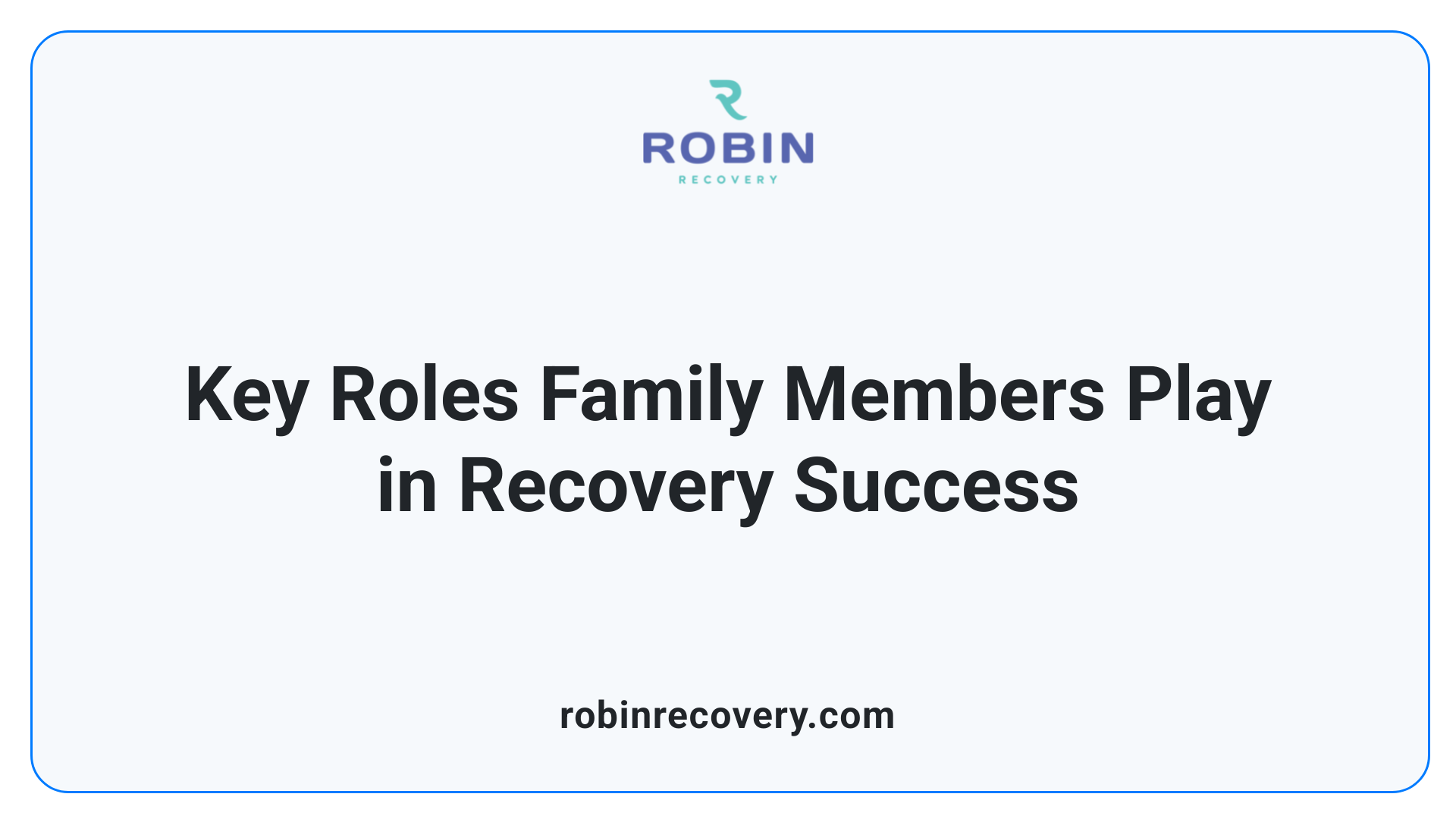
What roles can family members play to enhance recovery outcomes?
Family members play crucial roles in enhancing recovery outcomes by providing both emotional and practical support. This support system can take various forms, including:
- Accompanying loved ones to treatment: Family members can help reduce anxiety associated with treatment and create an encouraging atmosphere.
- Participating in therapy and treatment: Engaging in family therapy sessions allows family members to express their feelings and concerns while learning effective communication strategies. This collective participation promotes a deeper understanding of addiction and aligns everyone's efforts towards recovery goals.
Fostering a supportive recovery environment
Family therapy sessions enable open communication, helping to address issues related to addiction and promoting collective healing. Programs like the Five-Day Family Program offer structured activities to strengthen family bonds and equip them with coping strategies.
Ultimately, a strong support network, including extended family involvement, contributes significantly to sustained sobriety and healthier family dynamics, which are vital for successful recovery. The active participation of family members instills a sense of accountability and motivation for the individual in recovery, reinforcing their commitment to recovery goals.
The Importance of Family Involvement in Treatment
Why is it important to involve the family in the treatment process?
Involving the family in the treatment process is crucial because it can significantly reinforce and motivate change in the client, helping them remain engaged in their recovery. Families often want to help but may not know how; educating them about the treatment process can facilitate their involvement.
Positive family dynamics are especially important in treating substance use disorders. Strong family support enhances a patient's engagement and fosters healthier relationships. Family therapy not only assists individuals in recovery but also helps families adjust and establish new routines.
Reinforcing change in the client
Family involvement allows for a collaborative approach to recovery. By participating in therapy, family members can learn effective strategies to support their loved ones, reducing the potential for enabling or codependent behaviors. This shift fosters a healthier home environment, which is vital for sustaining treatment progress.
Enhancing patient engagement
Research has shown that when family members actively engage in the treatment process, patients are more likely to stay committed to their recovery plans. Emotional support from family members provides accountability and encouragement, assisting patients in navigating challenges and keeping them focused on their goals. This engagement is complemented by improved communication skills that family therapy nurtures, ultimately enhancing the recovery journey.
Improving treatment outcomes
Ensuring family support can lead to improved treatment outcomes, including reduced substance use among adolescents. Families that learn to establish clear boundaries and communicate openly create a more stable environment conducive to recovery. Furthermore, when families celebrate milestones together, it reinforces positive behavior changes, aiding long-term sobriety.
Contribution of Family Support in Treatment Impact on Recovery Benefits for the Family Involvement in therapy sessions Reinforces commitment to recovery Improved family dynamics Education on addiction and recovery Enhances understanding of the disorder Reduces feelings of guilt and shame Emotional and practical support Strengthens adherence to treatment Fosters empathy and connection
Family support is integral in addressing not just the individual’s recovery but also the emotional and psychological needs of the entire family, promoting overall healing and resilience.
Enhancing Communication and Relationships
Providing a safe space for expression
Family therapy serves as a structured environment where family members can openly discuss their feelings and experiences. This safe space encourages honest communication, enabling individuals to express their struggles without fear of judgment. As they learn to articulate their feelings, family members can facilitate emotional healing, which is crucial when navigating the complexities of addiction.
Building trust and empathy
Trust and empathy are vital components in rebuilding relationships strained by substance use disorder. Family therapy fosters understanding, allowing members to see things from each other’s perspectives. By recognizing the challenges faced by their loved ones, family members can develop compassion, fostering a supportive atmosphere conducive to recovery. This renewed trust helps individuals feel valued, promoting emotional connection as they embark on their healing journeys.
Improving family dynamics
Effective family therapy can significantly improve family dynamics, addressing underlying issues that contribute to dysfunctional behavior. Through guided conversations, families learn to establish boundaries and eliminate enabling behaviors. This not only strengthens the support network but also creates a healthier environment, wherein each member plays a role in promoting the recovery process. Improved communication and understanding lead to an overall increase in family cohesion.
Addressing Challenges in Family Involvement
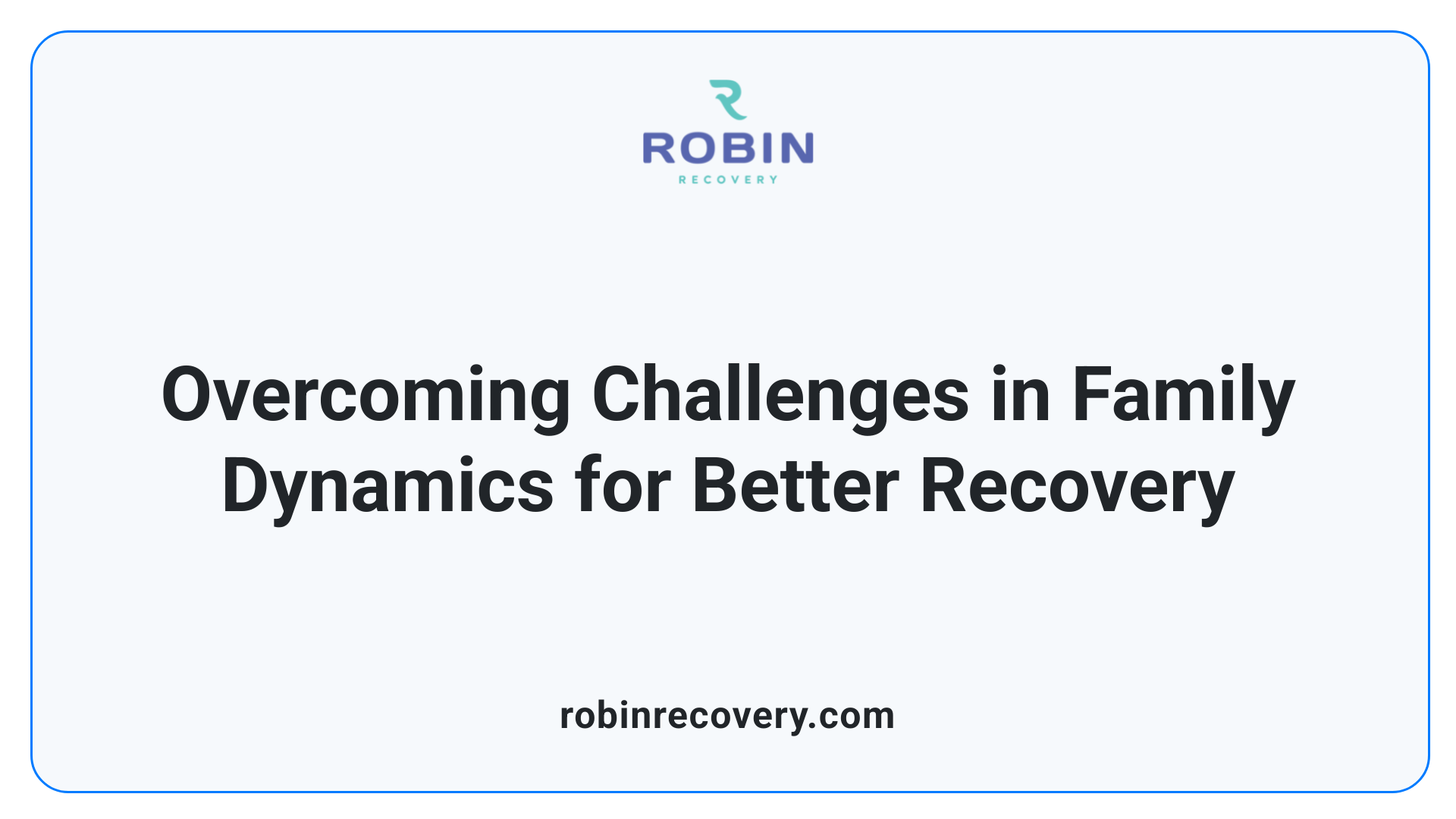
Dealing with dysfunctional family dynamics
Family dynamics can create substantial barriers in the recovery process, especially if the family is dysfunctional. The American Psychological Association defines such families as those where communication and relationships suffer from impairment. This dysfunction can stem from factors such as unresolved trauma, mental illness, or substance abuse within the family. Recognizing these patterns is the first step toward healing. Engaging in family therapy allows members to address underlying issues and open channels for more effective communication.
Avoiding enabling behaviors
It's crucial for family members to identify and halt enabling behaviors that can hinder recovery. Enabling behaviors often include providing financial support or shielding the loved one from the consequences of their addiction. Family therapy can help in educating members about boundaries, motivating them to adopt healthier interactions that promote responsibility and accountability.
Facilitating interventions with professional guidance
When family dynamics present challenges, it may be beneficial to organize an intervention. An intervention, ideally facilitated by qualified professionals, allows families to confront the individual with compassion and understanding. This structured approach helps in kickstarting the recovery journey, ensuring that the conversation remains productive and safe. Families involved in such processes are more likely to support the recovering individual effectively, significantly contributing to positive treatment outcomes.
Continuous Support and Sustaining Recovery
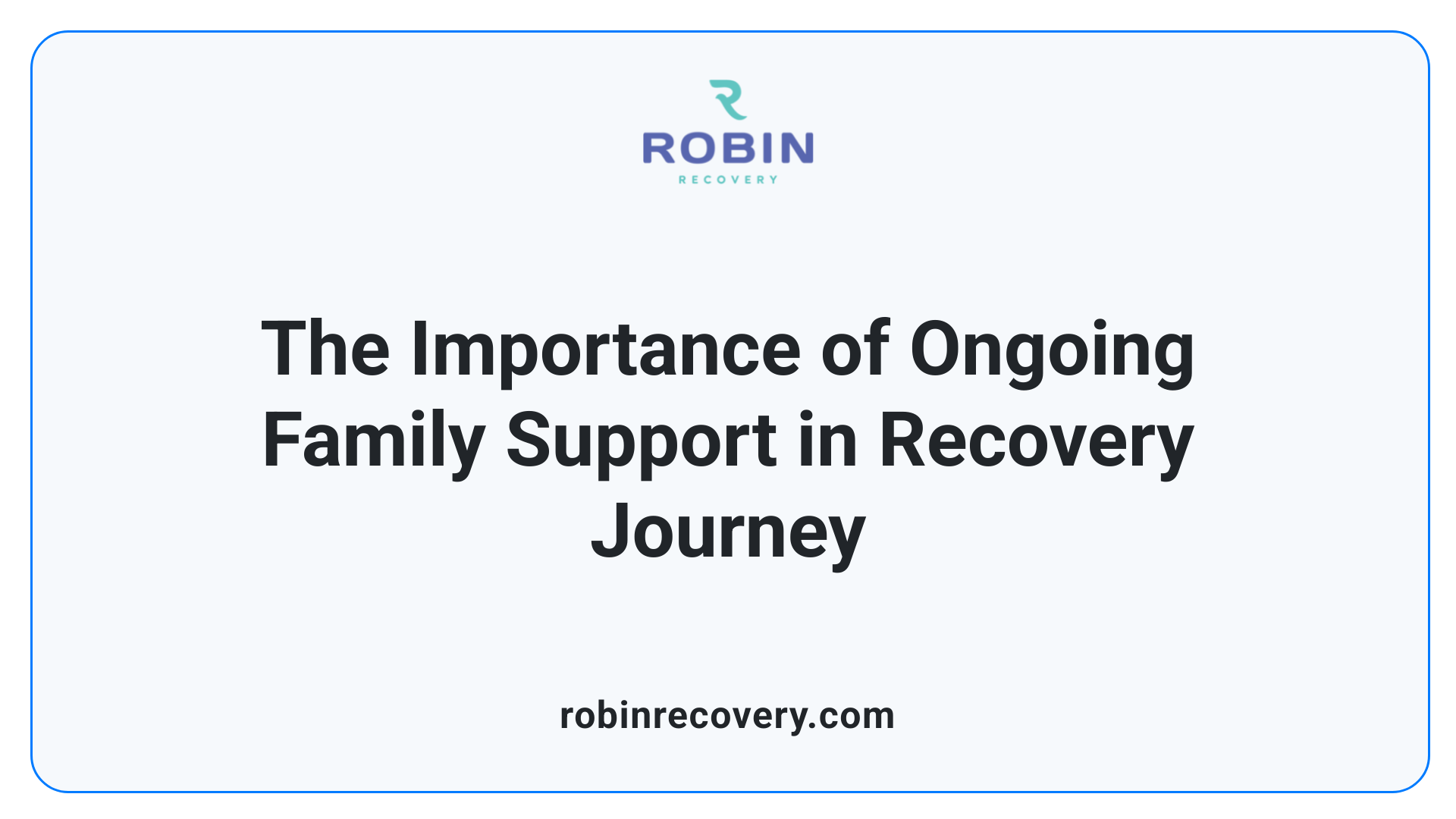
Providing Ongoing Encouragement
Family support plays a vital role in addiction recovery. Continued involvement from loved ones instills hope, strength, and encouragement, which are essential for individuals facing the challenges of substance use disorders. Simple gestures, like checking in on recovery goals, can significantly impact a person's motivation and commitment to sobriety.
Emotional validation from family members helps individuals feel accepted and less isolated. This support reduces feelings of guilt and shame, making it easier for them to navigate their recovery journey.
Maintaining Routines and Accountability
Establishing daily routines with family support is crucial for reducing stress in recovery. Regular schedules aid individuals in focusing on their healing process while minimizing overwhelming responsibilities.
Moreover, family members play an essential role in maintaining accountability. Active participation ensures that recovering individuals adhere to treatment plans, stay engaged in therapy, and attend support meetings.
Celebrating Milestones in Recovery
Recognizing and celebrating personal milestones—big or small—fosters self-esteem and reinforces commitment.
Acknowledgment of progress can empower individuals in recovery to stay motivated. Remembering achievements alongside family not only strengthens relationships but also builds a more positive and supportive atmosphere essential for long-term sobriety.
Conclusion
In conclusion, the recovery process is most effective when it is a collaborative effort involving both the individual and their family. With family support, the individual in recovery can experience substantial emotional, psychological, and practical benefits that contribute to sustained sobriety and improved mental health. As we have explored, the engagement of families in recovery is not only beneficial for the individual struggling with addiction but also promotes healing and well-being across the family unit, strengthening bonds and enhancing overall quality of life. For those beginning the recovery journey, or supporting a loved one through it, recognizing and embracing the power of family involvement can make all the difference in fostering long-term success and happiness.
References
- Healing Benefits of Family Therapy in Recovery - Willingway
- The Benefits of Family Involvement in Recovery - Parkdale Center
- What are The Benefits of Family Involvement in Recovery?
- The Role of Family Support in Addiction Recovery
- Importance of Family Support Addiction Recovery
- The Importance of Family in Treatment - Sage Recovery
- The Importance of Family Support in Local Addiction Recovery
- Family Roles in Addiction & the Importance of Family Support in ...
